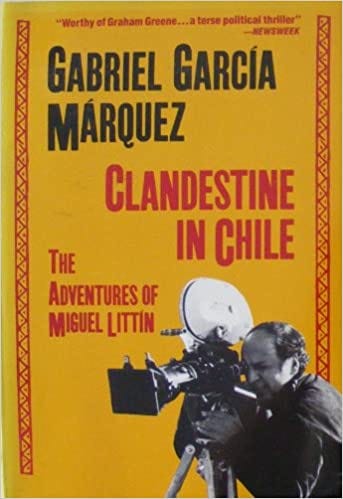Nobel Prize Author, Gabriel García Márquez, books burned in Chile
Pinochet's Military Dictatorship was a time of draconian censorship
Gabriel García Márquez won the Nobel Prize for Literature in 1982. 15,000 copies of his book, Clandestine in Chile: The Adventures of Miguel Littín, were seized by customs in Valparaíso, Chile on November 28, 1986 and burned by military authorities. The novel was about an exile’s return to the Chile of General Augusto Pinochet.1
Freedom of expression in Chile was subjected to restrictions perhaps unparalleled among Western democracies under Pinochet.
The onslaught on press freedoms and the repression of political dissent in the aftermath of the military coup were harsher, more drastic and sweeping, than anything seen before in Chilean history. All the press that had backed the former government were closed or expropriated, and in some cases their premises were destroyed. Hundreds of journalists were forced to flee the country or thrown out of work, others were banished to distant regions. Television stations were brought under government control and the universities intervened by rectors appointed by the military. In the years that followed, the regime used virtually every method in the censor’s repertoire: prior censorship of news and opinion, the banning of films for ideological reasons, concoction and dissemination of false information, impounding of publications, closures,the enforcement of draconian national security laws, harassment and intimidation. 2
Roberto Herrscher “Gabriel García Márquez’s Three Nonfiction Books: A Trilogy on Fear and Resilience.” Literary Journalism Studies, Vol. 10, No. 2, Fall 2018.
Human Rights Watch. Freedom of Expression Under the Military (1973-1990) in Freedom of Expression and the Public Debate in Chile, Nov. 1998.



It's interesting how we view historic censorship as opposed to current censorship. Social media has given us a real time view into what journalists, artists and others think about all this.
From the Red Scare of the 1950's to the US reaction to the Anti-WWI movement to the dictatorship of Pinochet in Chile, history creates this illusion of universal condemnation from artists and others on one side with a regime that simply doesn't care on the other. What I'm seeing in this current wave of censorship is a lot of justifying, excusing and explanations why none of this is actually censorship and it's nothing we should concern ourselves with. I wonder if future history books will include these voices that were absent from history books in the past?
Ability to express ourselves about an unequaled span of thought and emotion is what separates us from other species. Overlooking that for temporary political advantage demeans the destroyer more than anyone else. As Nancy Pelosi was quoted in July 2020 about the destruction of Christopher Columbus's statue in her hometown of Baltimore, "People will do what they will do."
https://thefederalist.com/2020/07/09/nancy-pelosi-on-mobs-removing-statues-people-will-do-what-they-do/
My apologies for failure to format the footnote properly.